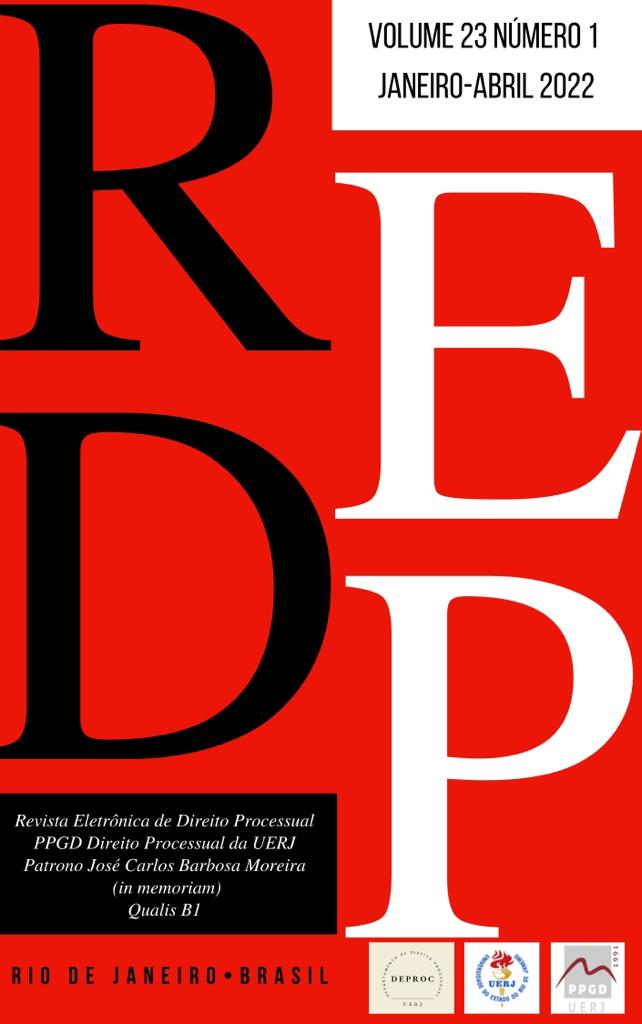FOR A NEW ORALITY IN THE CIVIL PROCESS: JUDICIAL COOPERATION, EFFICIENCY AND SYNCHRONICITY
DOI:
https://doi.org/10.12957/redp.2022.64406Keywords:
democratic profile of jurisdiction, effective adversary, technology, efficiency, oralityAbstract
How can the constitutionally inspired democratic profile provide the jurisdiction with a gain in legitimacy? With the lively purpose of shedding light on this fundamental questioning, which demands an amalgamated analysis of efficiency that takes into account speed and respect for the fundamental guarantees of the parties in the process, the necessary guidelines for the construction of a structured and adequate model of procedure that makes it possible to achieve socially fair results. Throughout the article, considerations are raised regarding the notion of effective adversary and the role of the principle of cooperation as a working community that authorizes, above all to the parties, the exercise of influence in the construction of the decision rule by the judge. Also considered are considerations related to the principle of efficiency in the managerial and jurisdictional aspect of the Judiciary Branch's performance, with the partial conclusion that efficiency assumes different roles as a motto of the jurisdiction, and as a shaping principle of the procedure. Subsequently, considerations regarding orality in the process are developed, and about the supplementary role of the courts in structuring the evidence, based on a relatively open model designed by the new Civil Procedure Code.Downloads
Published
How to Cite
Issue
Section
License
Todos os artigos publicados na Revista Eletrônica de Direito Processual (REDP) (Departamento de Direito Processual, Universidade do Estado do Rio de Janeiro, Brasil) são licenciados por meio de uma Licença Creative Commons - Atribuição 4.0 Internacional (CC BY 4.0).
Os autores retêm os direitos autorais de seu artigo e concordam em licenciar seu trabalho com a licença CC BY 4.0, aceitando assim os termos e condições específicos desta licença disponíveis no seguinte website: https://creativecommons.org/licenses/by/4.0/legalcode.
- Os autores concedem à REDP o direito de primeira publicação, de se identificar como publicadora original do trabalho e concedem à revista uma licença de direitos não exclusivos para utilizar o trabalho das seguintes formas: Reproduzir, vender e distribuir cópias eletrônicas ou impressas do manuscrito como um todo, de partes específicas do manuscrito e de suas traduções para qualquer idioma;
- O uso do artigo por terceiros é livre, contanto que a integridade da publicação seja mantida e seus autores originais, periódico de primeira publicação e detalhes de citação sejam identificados.
Dentro dos termos da licença, os autores podem entrar em acordos contratuais adicionais separados para a distribuição não exclusiva da versão publicada do trabalho na revista.
Copyright and Licensing
All articles published in the Procedural Law Electronic Review (REDP) (Department of Procedural Law, State University of Rio de Janeiro, Brazil) are licensed under a Creative Commons License - Attribution 4.0 International (CC BY 4.0).
- Authors retain copyright to their article and agree to license their work under the CC BY 4.0 license, thereby accepting the specific terms and conditions of this license available at the following website: https://creativecommons.org/licenses/by/4.0/ legal code.
- Authors grant REDP the right of first publication, to identify itself as the original publisher of the work, and grant the journal a non-exclusive license to use the work in the following ways: Reproduce, sell and distribute electronic or printed copies of the manuscript as a whole, of specific parts of the manuscript and its translations into any language;
- Use of the article by third parties is free, as long as the integrity of the publication is maintained and its original authors, first publication journal, and citation details are identified.
Within the terms of the license, authors may enter into separate additional contractual agreements for the non-exclusive distribution of the published version of the work in the journal.





